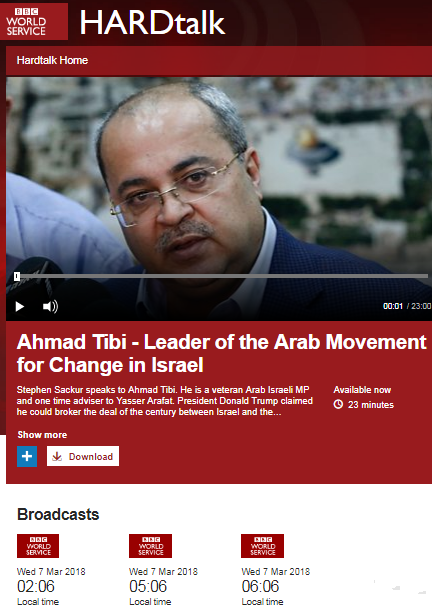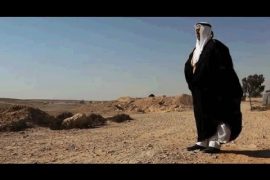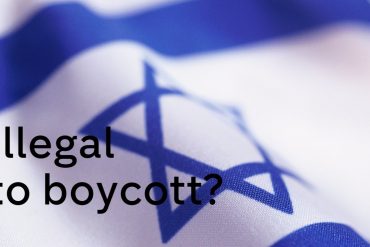In late April BBC television audiences saw a report by Yolande Knell which gave entirely unchallenged amplification to defamatory falsehoods concerning Israel and Israelis from the families of Palestinian terrorists. An audio report by the BBC’s Middle East editor Jeremy Bowen which was broadcast on BBC Radio 4’s ‘Today’ programme on May 4th (from 02:39:47 here) indicates that Knell’s report was not an isolated case of lapsed editorial judgement.
Presenter Sarah Montague introduces the report as follows:
“Tension is rising once again between Israelis and Palestinians. Seemingly random attacks by Palestinians on Israelis continue. Israel continues to expand settlements for Jews in the occupied territories that contravene international law. There are no peace talks and no attempt is being made to revive them. Our Middle East editor Jeremy Bowen reports from Jerusalem and the West Bank.”
In addition to making no effort to meet BBC editorial guidelines on impartiality by informing audiences of the existence of legal opinions which contradict the view that settlements “contravene international law”, Montague fails to tell them that just last month the Israeli prime minister attempted to “revive” talks by inviting the PA president to Jerusalem.
Bowen’s report opens with a recording of the voice of a girl who was prevented from carrying out a stabbing attack in Karmei Tzur on February 9th – a story not covered by the BBC at the time.
“You can hear how young Dima al Wawi is in her voice. She’s a 12 year-old Palestinian schoolgirl sitting with her parents in the kitchen, engrossed in Facebook. But instead of checking out her friends, she’s looking at video of her arrest. Dima has only recently been released from an Israeli jail. She served 75 days of a four-month sentence for planning to stab an Israeli at a Jewish settlement. She was arrested near her home in Halhoul on the west Bank. Dima didn’t get close to any Israelis as security guards stopped her.”
Apparently Bowen does not count the security guard himself as Israeli. Listeners then hear a voice-over of al Wawi speaking:
“The settlers saw me and stopped me. They made me lie on the ground, tied my wrists with plastic handcuffs and they stepped on my back.”
Bowen goes on:
“She pleaded guilty but now she says she was innocent and bullied into confessing. Twice her parents said she was questioned without a lawyer present.”
Voice-over: “I [unintelligible] we’re young kids. It’s sad that they do this to us. We’re oppressed. What I know is that I’m from Palestine. I don’t know about politics.”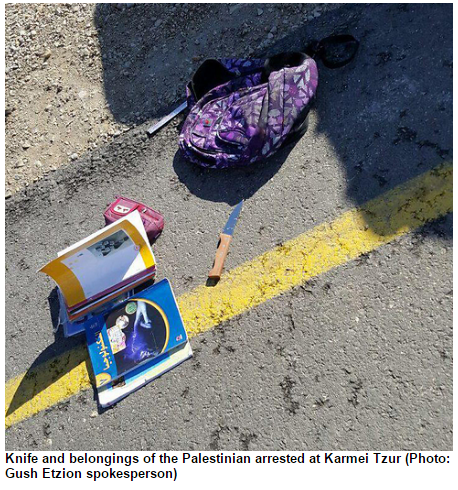
Had the BBC covered the story at the time, Bowen would perhaps know about the knife found in al Wawi’s possession. After listeners hear the sound of a siren, Bowen continues – severely downplaying the number of terror attacks which have taken place during the last seven months. [emphasis added]
“Israelis are nervous. Since October last year Palestinians – mostly armed with knives – have launched dozens of attacks. A Palestinian exploded a bomb on a bus in Jerusalem last month. For Israelis that revived horrific memories of bus attacks that killed hundreds in the last Palestinian uprising. I’ve come to Hadassah Ein Kerem hospital which is the main hospital in Jerusalem and here one of the victims is still being treated. She’s a girl called Eden Dadon…eh…15 years old, very badly burned in the bus attack and I’m here with Eden’s older sister Shiran. When you’re walking down the street or if you go somewhere and you see a Palestinian person – I mean, what do you think?”
Listeners are not informed that Eden and Shiran Dadon’s mother was also injured in the same attack either before or after they hear the following voice-over.
“I think why are they so evil? Why are they so bad? Why can’t we live in peace? These are wars that we’ve been living with for years and we’ll never find a resolution to them because they hate us. We hate them – it’s mutual. But the difference between us is they’re the ones who come to attack.”
Bowen then goes to meet the family of the perpetrators of another attack which was not reported by the BBC when it took place at Qalandiya checkpoint on April 27th.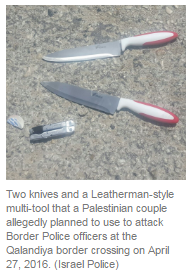
“Back in the ’90s when the peace process started there was a sense of hope that things might get better but now there is nothing like that. In fact here on the West Bank there’s a lot of anger. I’m in Bidu – a Palestinian village – and the village is close to Jerusalem as the crow flies but actually it’s a world away. Most of the Palestinians who live here can’t travel to Jerusalem – to the holy city – because of Israel’s security regulations.”
Bowen of course neglects to remind listeners that those “security regulations” came into being because of Palestinian terrorism. Like Yolande Knell before him, he then goes on to amplify unsupported claims and blatant falsehoods from family members of attackers. [all emphasis added]
“Mourners gathered at the house of the Taha family. They were angry because Israeli private security guards had shot dead Ibrahim Taha aged 16 and his sister Maram who was 23 at a checkpoint into north Jerusalem. Maram allegedly threw a knife at the police. The family say they were both innocent – shot in cold blood by trigger-happy guards. Tahri [phonetic] Taha said her brother and sister didn’t have a chance.”
Voice-over: “They’re used to this. It’s normal for them. They kill us. They kill innocent children in cold blood. Our martyrs are in heaven – that’s enough for us. They’re used to this. It’s in their blood. They want to get rid of us in any way. They have a law: whenever they see an Arab their policy is to kill them. Killing is their policy – even old people and kids.”
Bowen: “Her uncle Abdallah joined in.”
Listeners then hear a man speaking in Arabic – including the words ‘al Yahud’ – the Jews. Bowen paraphrases his words as follows:
“He’s gesturing at the moment, saying if you scratch your head, they’ll kill you. If you just pick something off the ground, they’ll kill you. If you pick the phone out of your pocket, they’ll kill you.”
Jeremy Bowen of course knows full well that the claims made by both those interviewees are gross falsehoods. He does not however tell his listeners that but instead confines himself to saying:
“The Israeli government says that’s untrue. That Palestinians attack Israelis because they’ve been taught to hate them from childhood.”
Making no attempt whatsoever to inform BBC audiences on the very relevant issue of incitement, Bowen moves seamlessly on to showcase his next interviewee.
“Some Israelis disagree. One of them is Yehuda Shaul. He leads a group of former soldiers from the Israeli Defense Forces – the IDF. They campaign against the occupation in a group called ‘Breaking the Silence’.”
Shaul: “We believe the occupation is morally indefensible. We believe the occupation is morally unacceptable. We believe that it’s destroying the morality of the IDF. It’s destroying the morality of Israeli society. It’s destroying the professionalism of the IDF. Armies are not designed to rule an occupation for 50 years over millions of people. And we believe that ultimately in the long term, it destroys the strategic and security standing of Israel in the region. That’s why we’re against the occupation.”
Bowen does not bother to remind Radio 4 listeners of the fact that the ‘occupation’ came about because Jordan – itself the occupier of Judea & Samaria and sections of Jerusalem at the time – chose to join Egypt, Syria and various other forces in what was intended to be a war of annihilation against Israel.
Bowen: “We were in Hebron; a major flash point. When Jewish settlers spotted Yehuda Shaul they swore at him and called him a traitor.”
No context concerning the record, methodology – and foreign funding – of ‘Breaking the Silence’ is provided to audiences. Bowen then closes his report:
“The atmosphere between Israelis and Palestinians in the West Bank – including East Jerusalem – is more combustible than it’s been since the end of the second Palestinian uprising over a decade ago. History has shown that neither side can decisively beat the other. One day they might be able to make a peace deal. If not they face the slow drip of hate and the certainty of more killing.”
So what did licence fee payers get from this report? In addition to the one-sided promotion of a political NGO and trite slogans such as ‘occupation’ and ‘international law’ without any context or balance, they heard the generous amplification of blatantly false and defamatory claims bordering on the blood libel from Palestinians which went unchallenged in any serious fashion by Jeremy Bowen.
That genre of material is of course amply available to anyone with access to the internet and – rather than jumping on that already overcrowded bandwagon – the BBC with its remit of enhancing “UK audiences’ awareness and understanding of international issues” should obviously be helping audiences to look beyond such flagrant propaganda.
Given the proliferation of uninformed commentary from UK politicians and public officials of late, that remit carries particular importance and the fact that even the man in charge of the BBC’s Middle East related content fails to meet it clearly indicates a serious problem.

